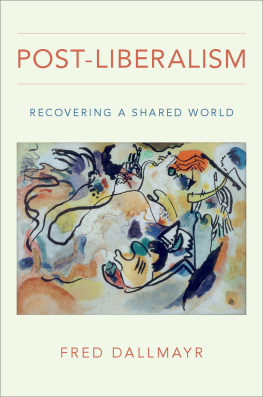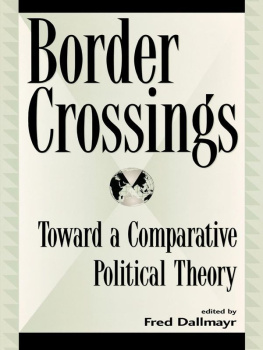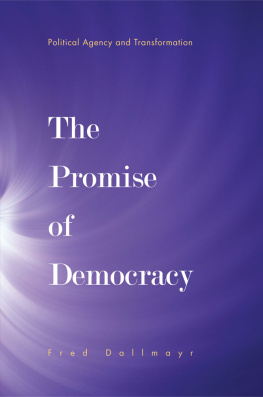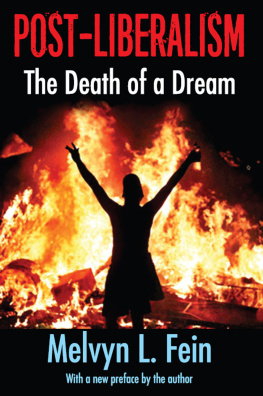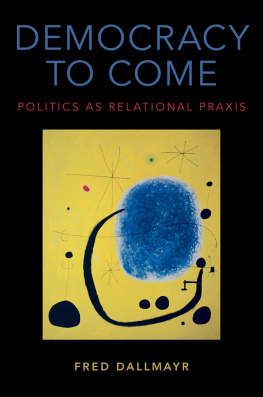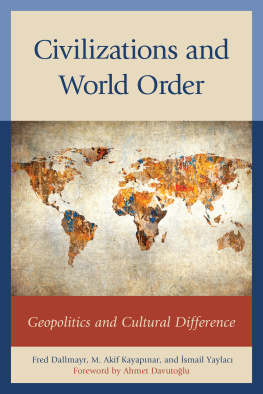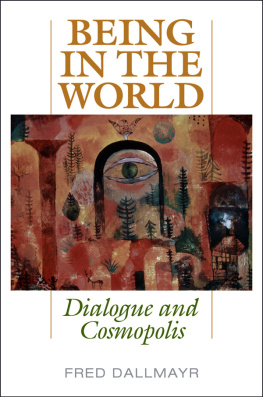Fred Dallmayr - Post-Liberalism
Here you can read online Fred Dallmayr - Post-Liberalism full text of the book (entire story) in english for free. Download pdf and epub, get meaning, cover and reviews about this ebook. year: 2019, publisher: Oxford University Press, genre: Religion. Description of the work, (preface) as well as reviews are available. Best literature library LitArk.com created for fans of good reading and offers a wide selection of genres:
Romance novel
Science fiction
Adventure
Detective
Science
History
Home and family
Prose
Art
Politics
Computer
Non-fiction
Religion
Business
Children
Humor
Choose a favorite category and find really read worthwhile books. Enjoy immersion in the world of imagination, feel the emotions of the characters or learn something new for yourself, make an fascinating discovery.
- Book:Post-Liberalism
- Author:
- Publisher:Oxford University Press
- Genre:
- Year:2019
- Rating:5 / 5
- Favourites:Add to favourites
- Your mark:
- 100
- 1
- 2
- 3
- 4
- 5
Post-Liberalism: summary, description and annotation
We offer to read an annotation, description, summary or preface (depends on what the author of the book "Post-Liberalism" wrote himself). If you haven't found the necessary information about the book — write in the comments, we will try to find it.
Post-Liberalism — read online for free the complete book (whole text) full work
Below is the text of the book, divided by pages. System saving the place of the last page read, allows you to conveniently read the book "Post-Liberalism" online for free, without having to search again every time where you left off. Put a bookmark, and you can go to the page where you finished reading at any time.
Font size:
Interval:
Bookmark:


Oxford University Press is a department of the University of Oxford. It furthers the Universitys objective of excellence in research, scholarship, and education by publishing worldwide. Oxford is a registered trade mark of Oxford University Press in the UK and certain other countries.
Published in the United States of America by Oxford University Press
198 Madison Avenue, New York, NY 10016, United States of America.
Oxford University Press 2019
All rights reserved. No part of this publication may be reproduced, stored in a retrieval system, or transmitted, in any form or by any means, without the prior permission in writing of Oxford University Press, or as expressly permitted by law, by license, or under terms agreed with the appropriate reproduction rights organization. Inquiries concerning reproduction outside the scope of the above should be sent to the Rights Department, Oxford University Press, at the address above.
You must not circulate this work in any other form and you must impose this same condition on any acquirer.
CIP data is on file at the Library of Congress
ISBN 9780190949907
eISBN 9780190949921
To Charles Taylor and Michael Sandel
intrepid defenders of a sharable world.
This book is about a dawning age: when people are with each other more than they are separate from or against each other; when they are dwelling with nature rather than seeking to dominate it; when they are open to a divine promise rather than unleashing doctrinal strife. This age is slow in coming. The obstacles are immense. Hence, recovery is bound to be arduous.
In this change, there is no linear progression, no predictable evolution. Although requiring human engagement, there is no cause-effect relation. There is not one thing triggering a single consequence; rather, everything hangs together and changes together. There is a paradigm shift, a holistic transformation which Martin Heidegger has called Ereignis. We are presently in the midst of it.
The title Post-Liberalism gestures toward this change, without being able to exhaust it. What the title suggests is that Western modernitywhich we have traversed during the past four hundred yearswas in large measure the time of a self-centered and anthropocentric liberalism, an ideology celebrating human autonomy or independence from everything. This view is no longer plausible or tenable. Having become a bit more mature and sober, we have come to realize the relationality or inter-independence of everything. Socially and politically this means we are able (though not always ready) to practice shared public freedom in a relational democracy or commonwealth.
The tenor of this book resembles, but in crucial respects also differs from, other publications on the theme. First of all, it radically differs from writings attacking liberalism per se from a certain conservative (or Tory) perspective. For me, human liberty or freedom is an indispensable axiom of social and political life, especially in an era threatened on all sides by forms of totalitarian rule. In a more nuanced way, my book also distances itself from de Tocquevilles position (with which it shares some accents). As I see it, the basic problem of modern, especially democratic, politics for Tocqueville resided in the conflict between liberty and equality, more specifically between an intact liberal individuality and the danger of populist egalitarianism or massification. What this formulation neglects (in my view) are two things: first, the possibility of an ethical equality (as celebrated by Montesquieu, Dewey, and others); and second, the disappearance under his own eyes of traditional bourgeois individuality due to the onslaught of powerful social and economic forces.
Basically my book takes a more innovative approach: it does not seek to vindicate or glorify the past, but to understand and remedy present conditions. From the angle of the present, the pleasing assumptions of social conservatism simply no longer hold, mainly for two reasons: the rise of financial capitalism and the upsurge of globalization. Under the impact of neo-liberal capitalism the noble individuality of bourgeois times has been completely eroded or even eviscerated, leaving behind only the acquisitive individual concerned with the pursuit of selfish interest. At the same time, globalization has changed the character of the people in a modern democracy, in the sense that democratic equality has to make room for an expanding range of difference and otherness. As a result, the public sphere or community in contemporary democracy is challenged or jeopardized by both economic and cultural developments.
Here one begins to see the profound predicament of contemporary democracy: the fact that it is embroiled in a stark dilemma or antinomy. Neo-liberal capitalism entails the sundering or breakdown of all (non-economic) social relations; in particular, the policy of de-regulation has as a consequence the atomization of society into a multitude of competing fragmentspretty much in line with Hobbess conception of the state of nature (war of all against all). In its wake, however, this atomization leaves a void of meaning, beyond the goal of self-satisfaction. Sooner or later this void has to be filled, in order to give people a motive for social participation. As a rule, what fills the need of meaning for people is chauvinistic nationalism or the pursuit of national self-interest. Here we find the roots of liberal or neo-liberal totalitarianism: the unification of selfish interests in a nationalist or imperialist agenda. (To be sure, in actuality individual and national interest only coincide in the case of an elite of oligarchs or plutocrats.) Here one can also appreciate fully Heideggers statement (in his Letter on Humanism) that self-seeking nationalism is metaphysically on the same page with anthropologism and individual subjectivism.
The point of this book is to find a path beyond narrow selfishness and populist nationalism, a path which in broad terms involves the recovery of a shared inter-human space or world. The book takes its departure from the present wasteland of atomization, from the grim condition of neo-liberal egocentrism and narcissism. As a first step out of this morass, the text commends a turn to inter-human ethics, ). Thus, attention is given to the tensional relation between local and global concerns (under the heading of glocalism); to the relation between reason and faith as illustrated in the contest between world history and salvation history; and finally to the conundrum of particularism and universal holism and its impact on the meaning of freedom as well as the prospect of a just world maintenance.
As I should add, the search for and recovery of a shared public space or world involves also the recovery of a viable private sphere free from the stain of unilateral acquisitiveness. In this domain, neo-liberalism has been the source of great inner desolation and perversion. Where, one can ask, is there still room for genuine privacy when everythingall traditional public goodsare the target of acquisitive privatization: from schools, parks, and nature reserves to prisons, police, and private armies? Clearly, privacy has to be emptied or cleansed of all utilitarian traces to emerge again as the reflective mirror of the worlda tall order.
A few concluding words. If individual decentering or the debunking of egocentrism is the hallmark of post-liberalism, then I am not so much an author (with authority) but a decentered participant in this work. I owe so many debts to so many people that listing them all would require another volume. To be exceedingly brief, let me just mention such close friends as Richard Falk, Ashis Nandy, Tu Weiming, and Marietta Stepanyants. Closest to me, of course, is my wife Ilse with whom I celebrated recently our sixtieth wedding anniversary. My gratitude to her is immense, as is my gratitude to the rest of the family (children and grandchildren). In terms of gratitude, I should not forget my typist Cheryl Reed who has, for many years, transcribed my difficult handwriting into legible scripts.
Font size:
Interval:
Bookmark:
Similar books «Post-Liberalism»
Look at similar books to Post-Liberalism. We have selected literature similar in name and meaning in the hope of providing readers with more options to find new, interesting, not yet read works.
Discussion, reviews of the book Post-Liberalism and just readers' own opinions. Leave your comments, write what you think about the work, its meaning or the main characters. Specify what exactly you liked and what you didn't like, and why you think so.

